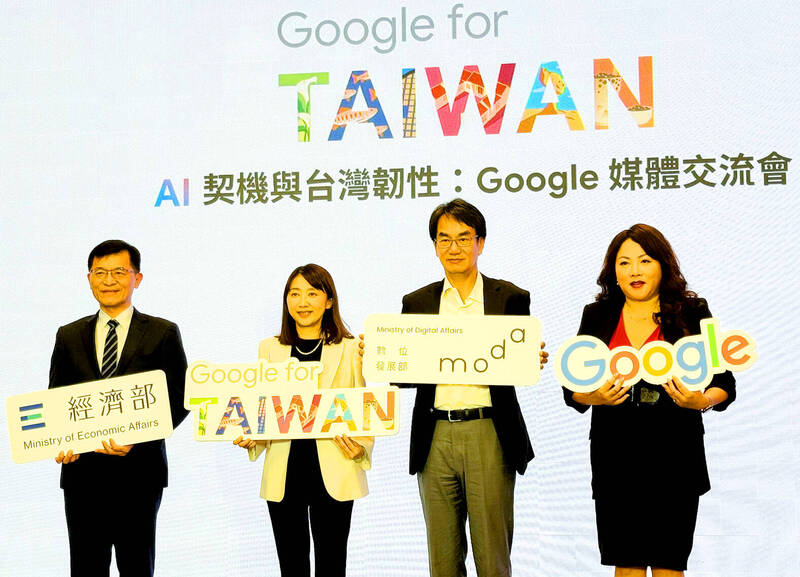《TAIPEI TIMES》 Google expects Taiwan to see significant economic boost from AI

From left, Deputy Minister of Economic Affairs Ho Chin-tsang, Google Taiwan managing director of sales and operations Tina Lin, Deputy Minister of Digital Affairs Lin Yi-jing and Google Taiwan government affairs and public policy head Anita Chen hold placards at an event in Taipei yesterday during which Google announced its artificial intelligence (AI) white paper, which calls on Taiwan to invest in AI infrastructure, cultivate AI talent and promote use of the technology. Photo: CNA
/ Staff writer, with CNA
Google yesterday said that Taiwan is set to accumulate about US$103 billion of economic benefits stemming from artificial intelligence (AI) development by 2030 and called on the government to work to strengthen AI infrastructure and universalize its use.
At its policy white paper announcement event in Taipei, Google said that McKinsey Global Institute predicted AI could add up to US$13 trillion to the global economy by 2030. The company added that in Taiwan, total gains were estimated to hit US$103 billion, citing a report by Access Partnership.
“The manufacturing industry is set to net the most, about NT$1.5 trillion (US$45.79 billion) or nearly 50 percent of all gains,” Google Taiwan managing director of sales and operations Tina Lin (林雅芳) said.
AI-driven cybersecurity tools could also help Taiwanese companies save up to NT$957.5 billion in economic losses from cybercrime by 2030, Lin said, citing the Access Partnership report.
Google has been playing its part by contributing to economic benefits and digital resilience through its investment in local research and development, data centers, and submarine cables, she said.
The company has also been working with the government and civil society to strengthen cybersecurity and combat disinformation, she added.
Lin highlighted the significant potential of AI in enhancing medical applications. Google, in collaboration with local hospitals and the National Health Insurance Administration, has been developing AI tools to aid in early breast cancer detection, assist with diagnosing illnesses, and predict medical conditions, she said.
Google Taiwan’s government affairs and public policy head Anita Chen (陳幼臻) said the government should invest in AI infrastructure, ensure the education system effectively cultivates talent and promote the use of the technology.
“Taiwan has key advantages in developing AI such as outstanding semiconductor and ICT [information and communications technology] industries, tech talent and a population willing to embrace new technology,” Chen said.
“But in the competitive world of AI, every decision could impact Taiwan’s ability to retain its competitive edge,” she added.
Chen said that the draft AI basic law was a good start and that Google recommended the legislation was “risk scenario-directed,” rather than placing restrictions on AI tools.
“The law should also determine ‘reasonable regulations’ concerning copyright so AI models can interact with a wide range of data,” she said.
Other policy suggestions include building an “AI talent-cultivating education system,” which should focus on training AI professionals and “equipping the general labor force with the ability to use AI applications,” Chen said.
The government should also promote the universalization of AI technologies, she said.
“The government can lead the way by using AI in public services to help universalize the technology and familiarize society with it,” she added.
Taiwan’s small and medium-sized enterprises and traditional sectors such as manufacturing and retail industries will need the government’s support in terms of funding and access to perform digital upgrades, Chen said.
新聞來源:TAIPEI TIMES



















